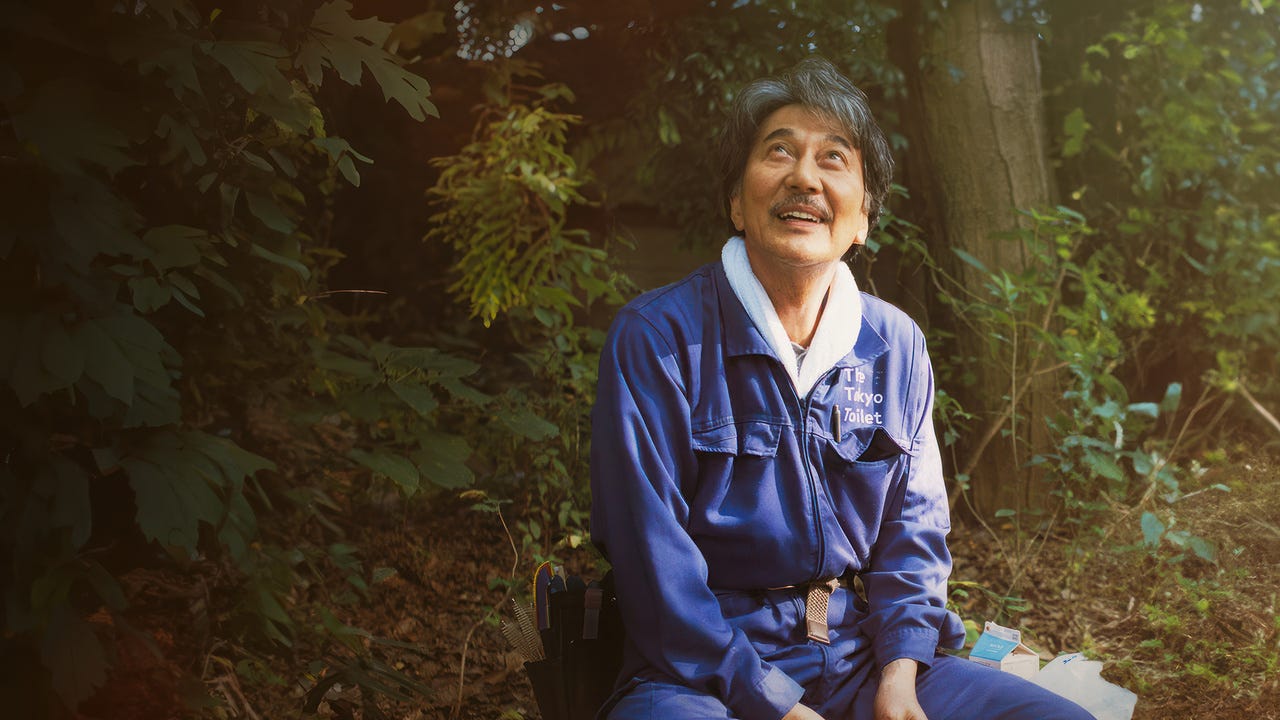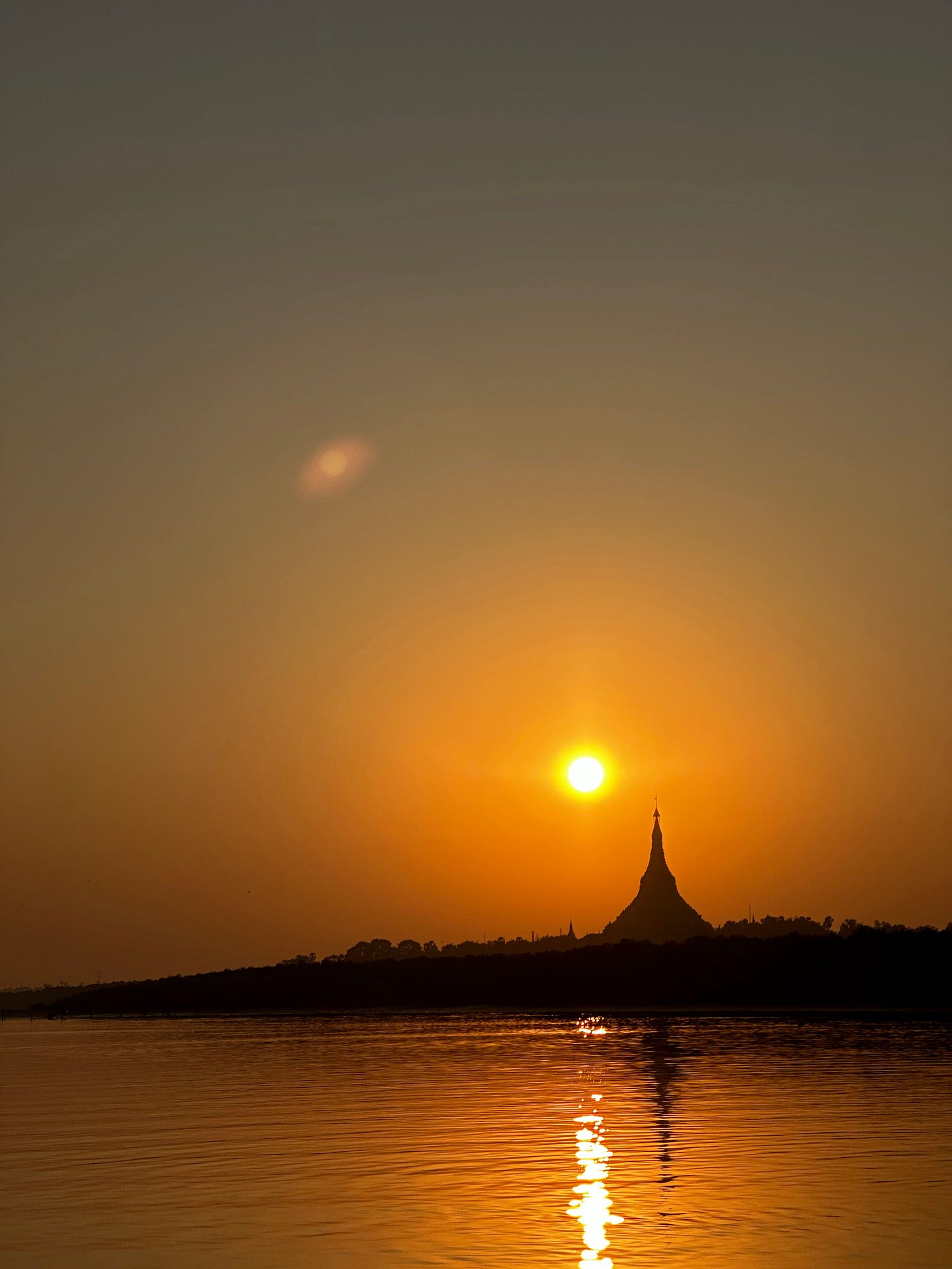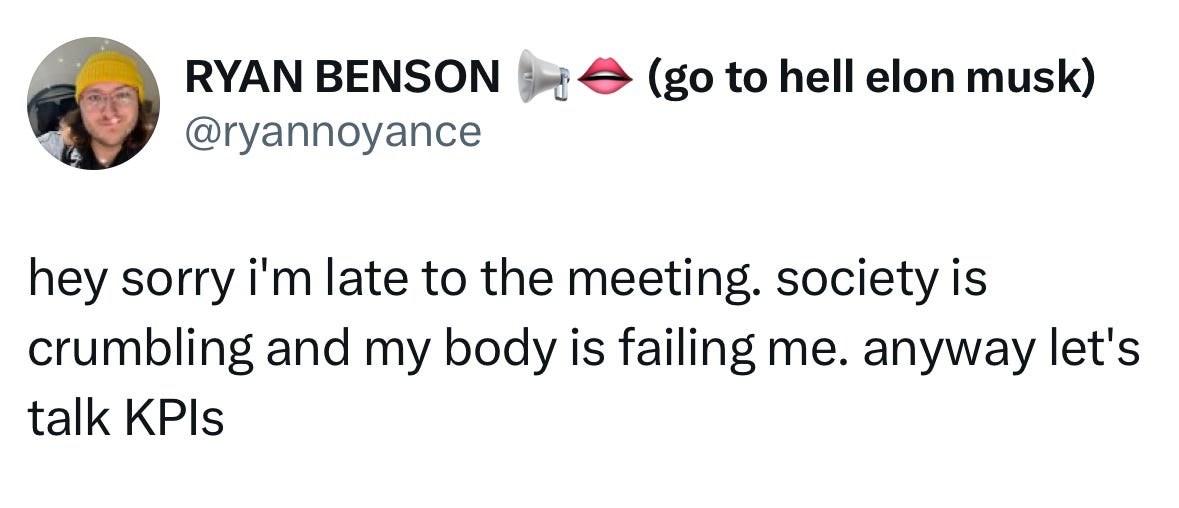On the Trail of Radical Contentment
I thought I was someone else / someone good
We’re halfway towards filling our first cohort of REBOOT dads. It’s been lovely to hear it resonate for so many. This week, I want to share a story about the final day of my thirties, a movie that rewired my brain chemistry, and how the media we choose to consume transforms our lives like little else. If you’re considering signing up for REBOOT, applications close on February 28th.
The really important kind of freedom involves attention, and awareness, and discipline, and effort, and being able truly to care about other people and to sacrifice for them, over and over, in myriad petty little unsexy ways, every day.
— David Foster Wallace, This is Water
On the final day of my thirties, I hopped on a northbound train from Santacruz station, heading towards the outer limits of Mumbai. Trains came thick, fast, and heavily packed in the opposite direction, commuters keeping doors open for ventilation as they hurtled towards whatever today’s working day might bring. Today was a day for my own work, more personal than paid. I’d come to spend a day at the Global Vipassana Pagoda, a monument to meditation completed in 2009—the world's largest meditation hall, its pillarless stone interior large enough for 8,000 to enter, cross their legs and focus on their breath.
I emerged from the station nearest Gorai Creek before making my way towards ferries being boarded by man and motorbike alike. We crossed the creek as the tip of the pagoda transformed from a vague, smog-hazed outline into a towering presence, its intricate golden spire undulating almost 100 metres into the sky.
The structure stands as a testament to the life’s work of meditation teacher S.N. Goenka: first in bringing vipassanā meditation back from Myanmar to India, and then spreading word of it throughout the world via a 10-day silent retreat, accessible across 255 centres in 94 countries—free to all, funded by donations alone. Access to the inside of the pagoda was restricted to those who had completed a previous retreat—people termed “old students.” The idea of becoming an old student rotates through my mind regularly since I committed to a meditation practice in 2019, but is currently filed away in the mental manila folder marked "once they're a little older."
If any of this feels counterintuitive to you, you wouldn’t be alone. Not the idea of 10 days of silence—what parent wouldn’t want that? In this house, we still reminisce about the three days my son lost his voice, an event approaching its second anniversary. But there’s dissonance in the dad who writes about finding joy in fatherhood whilst yearning for a week and a half to escape it. I’m facing a similar logical paradox this month—about to head away for a week in the mountains to work on a book about all the ways we can make the most of every moment with our kids. But this time is essential—we all know how hard it is to do deep work when they’re around, and whilst our children can fill us up, wearing our battery down comes much more naturally to them. And, back in Mumbai, the idea of intentionally bringing a boisterous three-year old to a place billed as being “built to serve as a monument of peace” felt both moronic and oxymoronic.
I wanted to be alone. I wanted to spent a day reflecting on the decade that had passed—the one that had taken me from London to California, before heading back to Europe again; the one that left me not just ten years older but with two “dependents” in my life that weren’t here last time the odometers of life rolled over from a nine to a zero. I spent a few serene hours there—walking around the perimeter, sneaking a look through gaps in towering wooden doors, breathing deep to get a sense of the space, reflecting on inscriptions painted inside gold frames on the outside walls.

After a while, hunger struck. Food options were limited, and I foolishly forgot to pack lunch. If this was in Europe or the US, McDonald’s would have absolutely found a way to open a nearby location, hawking Serenity Meals complete with a small plastic pagoda inside a larger paper one. Alas, it was not to be. I noticed off to the side, in the shade of a large tree, a small kiosk. I went over, grabbed a samosa and a cup of chai, sat down, and saw a sign.
I had left my son at home, but somehow he found me there. Under the spreading canopy of the Bodhi tree I felt his presence, reminded how often children appear in spaces where we search for solitude. This tree was a direct descendant of the sacred fig where the Buddha found enlightenment, tracing its lineage to a tree in Sri Lanka, tended by an uninterrupted succession of guardians for over 2000 years. As the sun slowly worked it’s way through the very same branches where Siddhartha Gautama realised that suffering comes not from pain itself but from our resistance to it, I reflected on my own journey here: how I struggled after Bodhi’s birth, my journey in learning to love him, the detour onto a path lesser travelled, one that led somewhere unexpected. That first year of fatherhood had been my own meditation on suffering and acceptance, moments of disconnection that still fill me with shame, and the gradual awakening to a love that transformed me only when I stopped fighting against it.
That was January, 2023. This essay marks the first time I’ve written anything about it, even for myself, even amongst the thousands of words lurking within hundreds of drafts behind the scenes of this newsletter. (Never start from a blank page, kids.) This deeply personal experience shifted me in significant ways—a feeling I internalised and carefully nested in a small mason jar before closing the lid tight, returning to it for occasional necessary sustenance. Usually I’m the only person who can unseal it. But it was shattered open this month as I watched Perfect Days, the gentle masterpiece from German director Wim Wenders.
Perfect Days follows Hirayama, a public toilet cleaner working in Tokyo, and over two hours tracks an eventfully light and emotionally powerful snapshot of his life. These seemingly identical days reveal themselves to be anything but—each morning brings its own quality of light for photographing trees, each cleaning routine reveals a new opportunity to apply his craft, each encounter with a person, book, or song opens fresh perspectives. He finds meaning in the smallest things—finding a tiny sapling in the park before taking it home and nursing it to the tree it might one day become. As we sink into his routines we begin to see what he sees: how no two days are the same; how each moment is packed with tiny revelations. Is his life boring? It depends on the perspective you arrive with, as Wenders offered in an interview: “Repetition as such, if you live it as repetition, you become the victim of it. If you manage to live it in the moment, as if you’ve never done it before, it becomes a whole different thing.”
The film slowly unravels, inviting you to slow down to its pace, its repetition and rhythms becoming hypnotic as they bring you into the orbit of those whose paths threaten the peaceful one of our hero. His young colleague Takashi—the physical manifestation of the Buddhist concepts of dissatisfaction and the monkey mind—has everything Hirayama does, but spends the entire movie complaining about his life and how he’d be happy if only he had more; perpetually distracted, never still enough to notice the life happening right in front of him. We meet his sister, a window into the past, providing quiet revelations on the simple, ascetic life Hirayama has chosen.
The film’s stellar soundtrack plays via a collection of cassette tapes as he drives around Tokyo in his microvan: The Velvet Underground, Patti Smith, The Animals, Nina Simone and Lou Reed, whose track “Perfect Day” just about lends the movie its title. No AI-generated smart playlists—just a bunch of albums on tape, played in full, to transport you back in time. (”Is this on Spotify?” a younger character asks him. “I don’t know,” he replies, “Where is that place?”) He drives around the city, the Tokyo Skytree so commonplace it becomes invisible to him, the soundtrack of his youth bridging the gap between the striving of a young man and the acceptance of an older one.
One thing that cuts deep, particularly for western viewers, is the stark divide between how Hirayama sees himself and how the world reduces him to his profession. In an early scene, he opens the door to a toilet and finds a lost boy. He gently escorts the child back to his mother, who looks up at this man—this photographer, this reader of literature, this human being—and sees nothing but a man who cleans toilets. Without a word, she reaches for her wet wipes, methodically cleaning the son's hand Hirayama had just held. It's a moment of casual cruelty that reveals how easily we dismiss the full humanity of others and how quickly we confuse what someone does with who they are.
Watching the movie, I noticed a feeling of envy arising towards this simple life, and Hirayama’s ease at finding joy within its confines. He places his flip phone at his front door immediately on returning home, before walking upstairs to tend to his plants. He reads one book at a time under a bare lamp, purchasing a new one only when he finishes the previous—no grand tsundoku piles here. His day begins not with an alarm clock, but the sound of a man sweeping the street outside his window, a small ritual offering at the same time each morning.
The word "radical" has been weaponised by our generation's productivity industrial complex: Radical Candor promises that optimising our management style will help us climb the ladder, whilst Radical Focus explores how to hack our approach to goal-setting and the almighty OKRs. But Wenders, through the sparingly used voice and wonderfully expressive face of Kôji Yakusho, shows us something different: this is what Radical Contentment looks like—a quiet rebellion against the endless striving that defines our era. While we’re here A/B testing our way to enlightenment, Hirayama has found peace in the simple dignity of doing ordinary work extraordinarily well.

Hirayama’s contentment isn't passive—it's a deliberate choice to find meaning not in status or achievement, or in boxes checked on some imagined scorecard of success, but in the quiet satisfaction of being precisely where you are. Throughout the film, he stops for lunch in a quiet park in the centre of Shibuya, an oasis of calm amidst the chaos of the city, and uses his old analogue camera to take pictures of sunlight shining through the trees. The Japanese have a word for what Hirayama captures in his photos: komorebi (木漏れ日, made up of the kanji characters for tree 木, shine through 漏れ, and sun 日). This shimmering of light and shadows, created as sunlight dapples through leaves overhead, becomes his source of joy, strength and serenity. Looking at the smile on his face, I recalled the warmth on my own, covered in the speckled shade of the Bodhi tree, counting down the last few hours of my thirties.
I think it’s a heroic act to be able to obtain enthusiasm and joy from the actual process of living from day to day.
—David Bowie
The REBOOT Media Diet
I could have easily written another thousand words about this movie, but it began to feel like I was stripping flowers off it to convince you of its beauty, rather than let you appreciate it in its entirety. It was on MUBI for a while, but now seems available only to rent—a small barrier towards viewing that vibes perfectly with the film’s themes of resisting instant gratification.
I've recommended it to countless others who have reported a similar rewiring of neural pathways. The best books and movies do this: they are portals to other realities. They allow us to peer into them and experience different perspectives on our own situations and troubles, and—in the right circumstances, with the proper support—to pull us into new realms, their substance and sensibilities becoming our own.
Over the past four years of writing this newsletter, I've shared hundreds of books, essays, and films that have shaped my journey as a father. These recommendations are small cairns left by previous travellers, the red thread in the labyrinth, subtle evidence that others have passed this way before, wrestling with similar questions, facing similar fears. I offer Perfect Days to you today, noting its arrival from the opposite direction: a coaching client who thought it might resonate given what we’d discussed in our sessions. He was right. The most impactful recommendations arrive as thus: at precisely the moment we need them, from someone who recognised in a piece of art the very thing we've been struggling to articulate.
When you meet the right cultural artefact at the right moment—whether it's a film, book, album, or poem—it can alter the trajectory of your life in fundamental ways. That's what this newsletter often aspires to be: a hobo code for dads, scratched into wooden markers along the path, signalling that something meaningful can be found here.
That's why film and books are such essential parts of REBOOT. As part of the six-month coaching plan, a small cohort of us will explore carefully chosen works that crack open the big questions we carry every month. We'll watch films like Perfect Days to see new ways of finding a sense of identity and source of joy divorced from the jobs we do. We’ll tackle Another Round, one of my favourite films from the last decade, and explore the idea of male community and mid-life transformation with unflinching honesty. Each month I’ll offer up three books to choose from—like David Whyte’s The Three Marriages, Michaeleen Doucleff’s Hunt, Gather, Parent and Simone Stolzoff’s Good Enough Job—that can challenge everything we thought we knew, and reimagine what it means to be present in the lives of those we care about the most. These aren't academic exercises or book reports, but jumping off points for the kind of late-night conversations that change how we see ourselves and our place in the world.
Over the last few days, I’ve been having introductory calls with the first set of dads who applied. We’re halfway towards filling our first REBOOT cohort, and it feels like something special is coming together. If you’d like to be part of it, let me know, and I’ll get in touch so we can find time to talk.
“Carry on — as uncertain and crooked as the path may be”
Back in 2020, Lottie from Leeds asked Nick Cave “How do I know I’m on the right path?” Cave’s response was short, poetic and powerful. I’m sure he won’t mind me sharing it in its entirety here:
“Look around you. If there are others all moving in the same direction, and they look like you, and they move like you, and they all like the same things, and they hate the same things, and they are angry about the same things, and they are screaming about the same things, chances are you are on the wrong path.
If you turn and veer onto a different path, even though these people who all think the same thoughts, and say the same things, and behave the same way, may look at you, and may scoff at you and may even threaten you, carry on—as uncertain and crooked as the path may be. Keep moving, because though this path may not be the easiest path, or even the best path, it will be the most interesting, the most instructive, even the most enlightened path.
It is your path, where you get to be who you want to be, say what you want to say, and love what you want to love—your path—and you can take much comfort from that, because you may be the one who shudders, you may be the one who spins and glows, you may be the one who shines, you may even be the one who bursts into flames, but even still, there you are and all along you go—your path, your path.”
Good Dadvice
Say Hello
How did you like this week’s issue? Your feedback helps me make this great.
Loved | Great | OK | Meh | Bad
Already seen the film? Hit that comment button underneath and let me know what you thought. This recommendation, like many others, appeared first in the Dadscord. Today’s a great day to join, and you’ll be ensuring this newsletter remains free to the almost 19,000 dads who read it every week.











Wonderful Kevin. The really lovely thing about the film is that with every conversation I have about the film, or every article I read about the film, or every moment I spend thinking about the film it goes from being my fav film of 2024 to one of my fav films ever. The ripples never seem to stop spreading. BTW. I'm visiting Japan for the first time next month. I'm stupidly excited!
This was beautiful. Thank you.